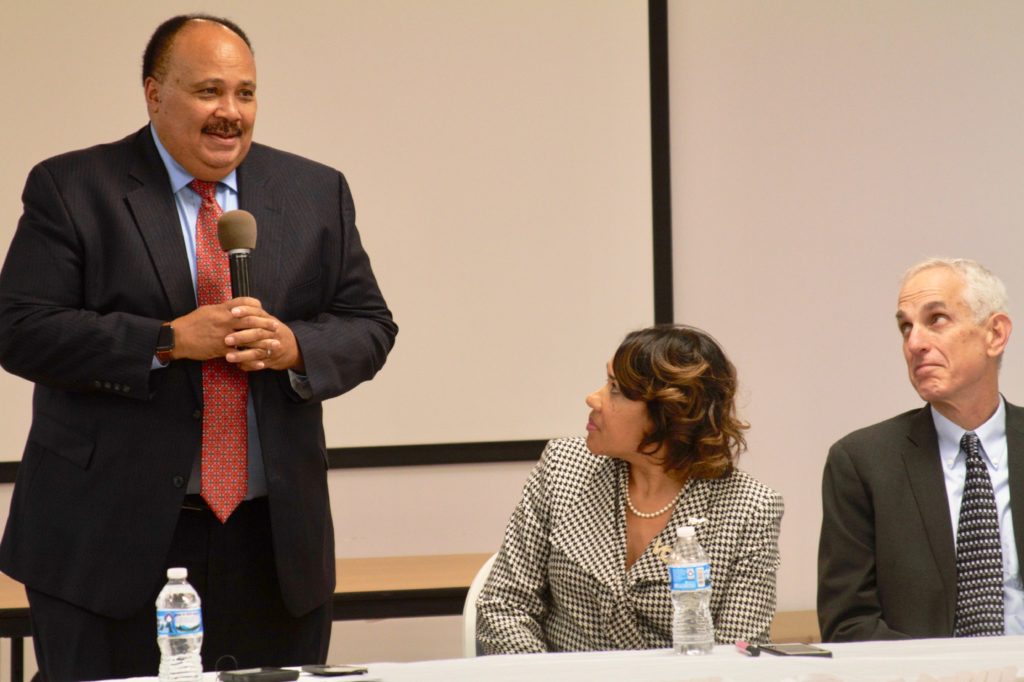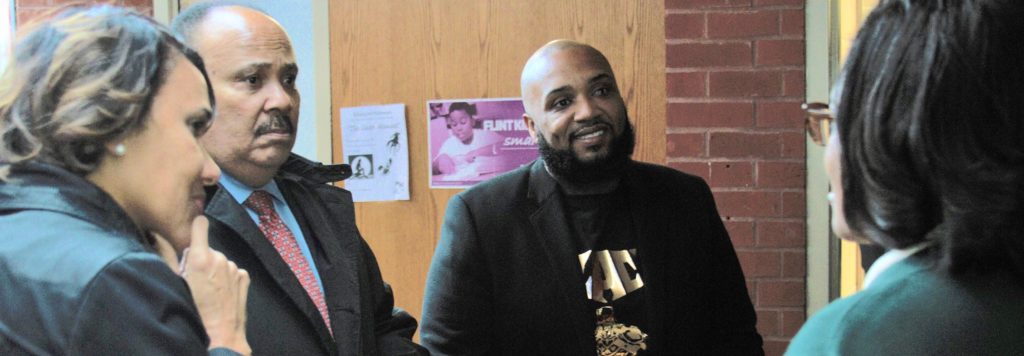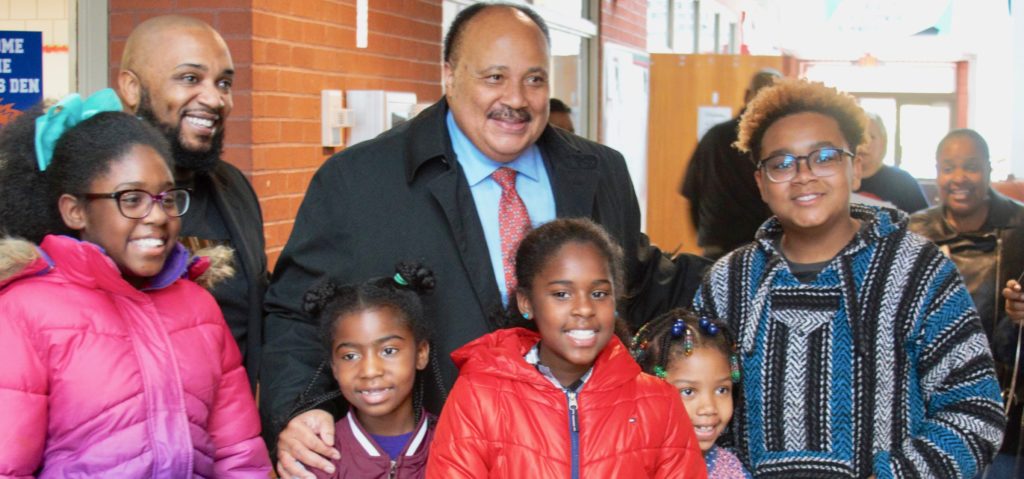By Tom Travis and Robert Baumgart
The nation needs to continue to hear about the Flint water crisis, Martin Luther King III, the oldest son of the late Martin Luther King, Jr., asserted during an appearance Friday, Oct. 26 at Grace Emmanuel Baptist Church in Flint.
“Perhaps this is a crisis that could have been avoided,” King said in response to questions from East Village Magazine at a press conference preceding the event.
“It seems to me that someone has to be held accountable. I’m looking at it from afar and I don’t personally believe that is being done thus far. Clean water should be available for each and every citizen of this nation,” he said.
“We have the resources, technology, the ingenuity. In communities of color in particular discrimination occurs at disproportionate levels.”
King commended Mayor Karen Weaver and her team, and said it was important “to continue to use our megaphone and to say, ‘look. the crisis is not over’ in this community.”
Weaver welcomed King and an audience of about 75 area pastors, community leaders and visitors to the church for what was billed as “a community conversation” about solutions for the water crisis. A luncheon was provided by the staff of Grace Emmanuel.

King with Weaver and Andy Buchsbaum (Photo by Tom Travis)
Among the visitors were Andy Buchsbaum, vice president of the National Wildlife Federation (NWF) and Simone Lightfoot, NWF national director of urban initiatives and environmental justice.
The NWF leaders had invited King to come to Flint to see the water line repair in action and observe the progress and restoration.
King, who was 10 years old when his father was assassinated in Memphis in 1968, expressed his heart for Flint and why he came to the city.
“Once stories move from the front pages, the assumption is that the crisis is gone, and the reality is that this crisis, while there have been aspects that have been addressed, it is still very much in the midst of being addressed,” he said.
Among the Flint leaders present were city council members Maurice Davis (2nd Ward) and Eric Mays (1st Ward); Steve Branch, city administrator; Pamela Pugh, City of Flint’s chief public health advisor; City of Flint Fire Chief Raymond Barton; Deputy Fire Chief Carrie Edwards-Clemons; Isaiah Oliver, president and CEO of the Community Foundation of Greater Flint; Adrian Walker, director of Government Affairs and Community Relations for the Flint and Genesee Chamber of Commerce; Rev. Marvin Jennings, host and pastor of Grace Emmanuel Church; and many Flint activists and residents.
“The nation needs to continue to hear about this issue because there is nothing more important in our lives than basic clean water, affordable water, quality water,” King told the crowd, “and this certainly is in my judgment Ground Zero for how a major catastrophe can occur that impacts the whole community and in a real sense, directly attacks the people.”
Buchsbaum, of the NWF, stated, “Bishop [Bernadel] Jefferson told me four years ago when I first came to Flint, ‘Don’t call it a crisis, it’s a disaster. A crisis passes, a disaster doesn’t. I’m based in Michigan, but I work all over the country and I can tell you that what happens to Flint doesn’t stay in Flint.
“There are communities all over the country that have high lead levels and they are looking at what you all are doing as whether it’s working or it’s not working. Whether they have hope or whether they have despair. In this, they have to have hope. We have to help them have hope. What you do here is a model for this country and we are all behind you.”
King closed by saying, “I want you to know as a community that we are in this fight with you.”
King reminisced, “I can’t imagine what my father and mother would say about a crisis that began in 2015. So I wanted to come to hear from you, what it is that we can do to be helpful.
“My dad taught us a few good women and men can bring about change,” King said. “It doesn’t take masses always, but it’s a few good women and men who are focused, who are dedicated, who are determined, who are dependable, that will bring about the change.”
“My dad understood the dignity and worth of every human being,” King said, “and he tried to promote a philosophy that created respect and admiration for every human being.
“He used a method called ‘non-violence’ to bring about change–to teach us how to live together without destroying persons or property, but respecting humanity and human life. We’re God’s highest creation and yet when we get ready to resolve conflict we resort to low animal means to do it.”

Mayor Weaver, King, Doyle Ryder Principal Kevelin Jones and Pamela Pugh (Photo by Tom Travis)
Dr. Pamela Pugh, the City of Flint’s chief public health advisor, also offered remarks.
“When we look at lead in the city of Flint, it does impact learning,” she warned. “Lead is one of the most studied environmental toxins that there is, and if we don’t know anything else about lead, we know it’s a neurotoxin that impacts our children’s learning ability, and we have seen the levels go up in IEP’s.”
Weaver stated, in response to a question from a community member, “People have asked me, ‘When’s everybody going to trust again?’ I just got that question today. I said, ‘I don’t know, it depends on how you were impacted. If you lost a loved one, you many never trust this water again and you can’t be blamed for that. If you have a child that’s been damaged cognitively, you may never trust again.
“I’m glad to have Dr King here so he can take this message back,” Weaver said, “because it’s going to take more than just us….we don’t seem to have a friend at The White House.”
Michael Harris, from the Flint Development Center (www.flintdc.org ), described what his agency is doing.
“We’ve been working on solutions. We offer young people an opportunity to make a change in their community, to become lab techs, to become chemists to test their own water,” he said.
“I had a death in my family from this water, but that’s made me rise up even stronger, more powerful and say ‘doggone it, we gonna do something in this community,” Harris said. “This is Flint, Michigan–We put the world on wheels, we fought the wars. We made sure that this country was solvent in Flint, Michigan. We can come through this, and we can be better for it, and we can make a difference.”

King (center) with Doyle-Ryder principal Kevelin Jones and students (Photo by Tom Travis)
Following the Grace Emmanuel event, King, Weaver, and others traveled to Doyle-Ryder School, where King met Principal Kevelin Jones and several students. Jones showed King and others the newly installed ultraviolet water filtration system. The system was made possible by a $480,350 donation last year from the Elon Musk Foundation to add ultraviolet water filtration systems and water stations to all 12 area schools. The systems employ an ultraviolet purification process to remove lead and bacteria from the water.
Banner photo: water droplet with ripples, public domain.
EVM Staff Writer Tom Travis can be reached at tomntravis@gmail.com. New EVM contributing writer Robert J. Baumgart can be reached at robert.j.baumgart@gmail.com.


You must be logged in to post a comment.